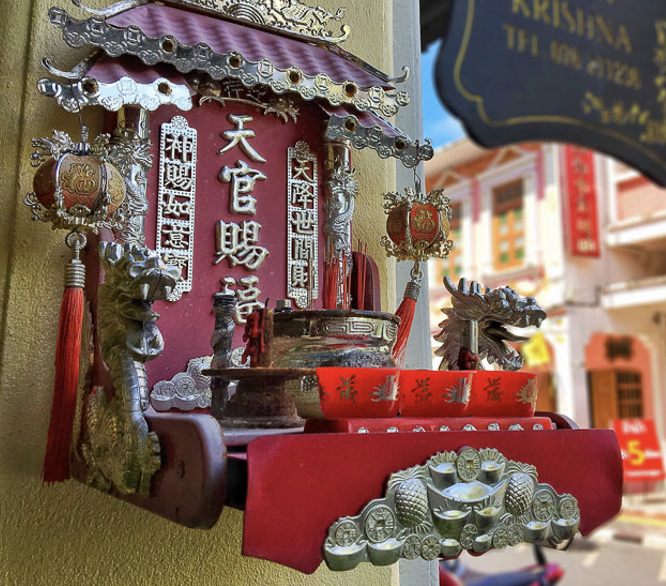The Consciousness of the Chinese Descendant's Inheritance to the Antecedent's Roots
DOI:
https://doi.org/10.69598/decorativeartsjournal.3.54%20-%2076Keywords:
identity crisis, Chinese offerings, Chinese immigrationAbstract
This article is part of a research project on the transmission of identity through the practice of traditional rituals among Thai-Chinese, a culture rich in heritage. It examines the history of ancestors who migrated from mainland China to Thailand during the 18th to 20th centuries. These immigrants faced significant challenges in their struggle for survival, including government policies aimed at controlling communism, which led to political oppression and discrimination from the Thai population. Despite these difficulties, Chinese immigrants played an important role in driving Thailand’s economy by establishing businesses and becoming key players in trade and commerce.
However, anti-communist policies and societal prejudices forced many Chinese immigrants to assimilate into Thai society through intermarriage with Thais and the adoption of Thai names and surnames, resulting in a crisis of Chinese identity that has diminished in subsequent generations. Despite these challenges, the Thai-Chinese community has continued to strive to preserve their cultural heritage and build an economy based on tradition.
In contemporary times, the world is rapidly changing, and the Chinese identity among younger generations seems to be fading. Interest in traditional rituals is diminishing and may not align with modern lifestyles. Practices such as ancestor worship, setting up altars at home, and the complexities of Chinese offerings are becoming less prevalent. This article explores the transformation of Thai-Chinese ritual practices from traditional methods to adapted forms by analyzing historical records, documents, and related research. The research hypothesis posits that preserving and practicing traditional rituals is crucial for strengthening family bonds and creating a unique identity for the Chinese community in Thailand. Thai-Chinese descendants recognize that their Chinese heritage is deeply connected to their ancestral roots. This connection fosters an appreciation for practicing Chinese traditions, vital for preserving their cultural heritage. Amidst a rapidly evolving society, how can traditional rituals retain their value and spirit for future generations? If these practices cannot adapt to the modern era, leveraging digital technology and multimedia communication might help sustain and modernize cultural heritage for the younger generation.
References
เจษฎา นิลสงวนเดชะ. (2561). ศาลเจ้าจีน : ศรัทธาสถานในสังคมไทย. วารสารภาษาและวัฒนธรรม 37(1 ). 47-70.
ถาวร สิกขโกศล. (2552). ไซอิ๋ว : ยอดนิยายมหัศจรรย์. ศิลปวัฒนธรรม.
ถาวร สิกขโกศล. (2557). เทศกาลจีนและการเซ่นไหว้. มติชน.
สิทธิเทพ เอกสิทธิพงษ์. (2566). เป็นจีนเพราะรู้สึก ประวัติศาสตร์เสื่อผืนหมอนใบที่เพิ่งสร้าง. สำนักพิมพ์มติชน.
สุวรรณา สถาอานันท์. (2556). กระแสธารปรัชญาจีน : ช้อโต้แย้งเรื่อง ธรรมชาติ อำนาจ และจารีต. สยามปริทัศน์
Chen, K. (1964). Buddhism in China : A historical survey. Princeton University Press.
Gaer, J. (1963). What the great religions believe [ศาสนาทั้งหลายนับถืออะไร]. สยามปริทัศน์ .
Guotu, Z. (2021). The overseas Chinese : A long history. The UNESCO Courier. https://doi.org/10.18356/22202293-2021-4-8
Hamilton, M. (2022, December 02). Pangu. Mythopedia. https://mythopedia.com/topics/pangu.
Hsu, C.-y., et al. (2009). Understandings of Death and Dying for People of Chinese Origin. Death studies, 33(2), 153-174.
Legge, J. (1878). The Chinese Classics. (n.p.)
Legge, J. (1882). The Sacred Books of China : The Yî King. Clarendon Press.
Legge, J. (1885). The Sacred Books of China : The Li Ki.
Legge, J. (1891). The Sacred Books of China : The Texts of Tâoism. Clarendon Press.
Migration, I. O. f. (2020). World Migration Report. https://publications.iom.int/system/files/pdf/wmr_2020.pdf
Rappaport, R. A. (1999). Ritual and Religion in the Making of Humanity. Cambridge University Press.
Scott, J. L. (2007). For Gods, Ghosts and Ancestors :
The Chinese Tradition of Paper Offerings. Hong Kong University Press.
Skinner, G. W. (1986). Chinese society in Thailand : an analytical history. [สังคมจีนในประเทศไทย : ประวัติศาสตร์เชิงวิเคราะห์]. มูลนิธิโครงการตำราสังคมศาสตร์และมนุษยศาสตร์.
West, B. A. (2009). Encyclopedia of the Peoples of Asia and Oceania. Facts On File, Inc.
Xu, Y. (2022). Digitizing death : commodification of joss paper on Chinese online cemetery. Journal of Cultural Economy, 15(2), 151-167.

Downloads
Published
How to Cite
Issue
Section
Categories
License
Copyright (c) 2024 DEC Journal

This work is licensed under a Creative Commons Attribution-NonCommercial-NoDerivatives 4.0 International License.
Published by Academic Affairs Division, Faculty of Decorative Arts, Silpakorn University. The copyright of the article belongs to the article owner. Published articles represent the views of the authors. The editorial board does not necessarily agree with and is not responsible for the content of such articles.


